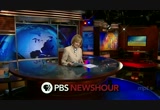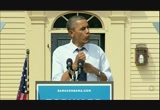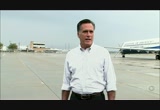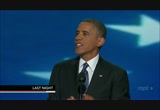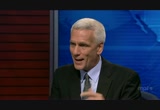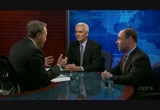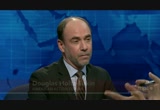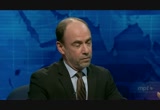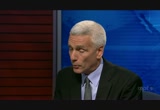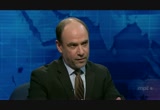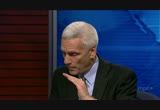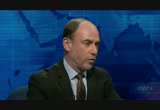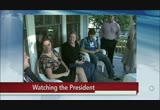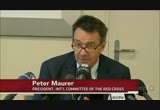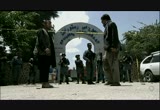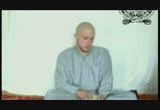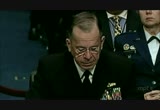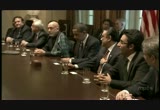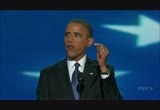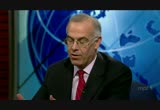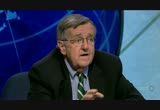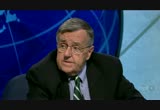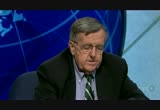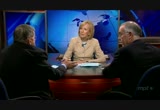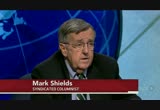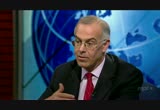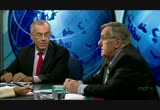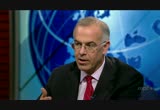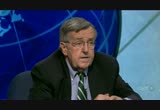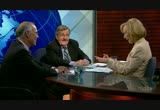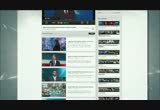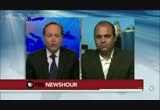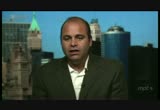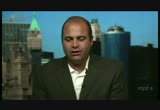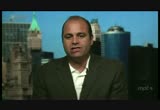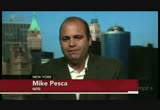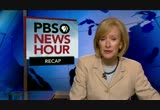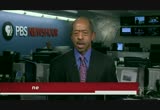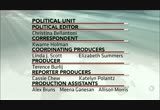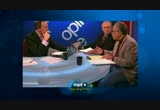tv PBS News Hour PBS September 7, 2012 6:00pm-7:00pm EDT
6:00 pm
captioning sponsored by macneil/lehrer productions >> woodruff: job growth slowed last month, unwelcome news for president obama's re-election bid, and a talking point for mitt romney's campaign. good evening. i'm judy woodruff. >> brown: and i'm jeffrey brown. on the newshour tonight, we debate the candidates' policy prescriptions, and the impact of the new numbers on any bounce for democrats after their convention. >> woodruff: ray suarez examines the pakistan-based insurgents known as the haqqani network, designated a terrorist group by the state department. >> brown: what will it take to convince voters still on the fence? margaret warner talked to a group of undecided virginians
6:01 pm
who watched the president's speech last night. >> i would have liked a lot more optimism, a lot more energy about moving forward. >> it didn't change my mind. it didn't change my opinion. it didn't offer anything that i didn't really know before. >> woodruff: back from two weeks of political conventions are mark shields and david brooks. >> brown: and who's calling the penalties and signaling the touchdowns? the football season begins with replacement referees. >> woodruff: that's all ahead on tonight's newshour. >> major funding for the pbs newshour has been provided by: ♪ ♪ ♪ ♪ ♪ ♪ moving our economy for 160
6:02 pm
years. bnsf, the engine that connects us. >> they can be enlightening or engaging. conversations help us learn and grow. at wells fargo, we believe you can never underestimate the power of a conversation. it's this exchange of ideas that helps you move ahead with confidence. because an open dialogue is what opens doors. wells fargo-- together, we'll go far. >> and by the alfred p. sloan foundation. supporting science, technology, and improved economic performance and financial literacy in the 21st century. >> and with the ongoing support of these institutions and foundations. and... >> this program was made
6:03 pm
possible by the corporation for public broadcasting. and by contributions to your pbs station from viewers like you. thank you. >> brown: the august employment report came in today, showing fewer than anticipated jobs created, and fewer americans still trying to find one. it was all fuel for the presidential campaign, with the conventions now over and 60 days to go until the election. for the president and his party, the celebrations at the democratic convention yielded to sobering new numbers on a still- struggling economy. u.s. employers did add 96,000 jobs in august, but that was well short of expectations. in addition, revised numbers showed 41,000 fewer jobs were created in june and july than first estimated. and the key manufacturing sector dropped 15,000 workers, the largest decline in two years.
6:04 pm
president obama left charlotte shortly after the report was released, traveling with vice- president biden to portsmouth, new hampshire. there, he emphasized that overall, the private sector is adding jobs. >> today, we learned that, after losing around 800,000 jobs a month when i took office, business once again added jobs for the 30th month in row, a total of more than 4.6 million jobs. ( cheers and applause ) but... but that's not good enough. we know it's not good enough; we need to create more jobs faster. we need to fill the hole left by this recession faster. we need to come out of this crisis stronger. >> brown: and the president insisted all of that could happen much faster, provided republicans in congress are willing to work with him. >> if the republicans are serious about being concerned about joblessness, we could create a million new jobs right now if congress would pass the jobs plan that i sent ot them a year ago.
6:05 pm
jobs for teachers, for construction workers, jobs for folks who have been looking for work a long time. we can do that. >> brown: republican standard bearer mitt romney traveled to the battleground state of iowa and zeroed in on the unemployment rate. it fell in august from 8.3% to 8.1% percent, but that was largely because more people stopped looking for work. >> after the party last night and the hangover today, the jobs numbers were very disappointing. for almost every net new job created, approximately four people dropped out of the workforce. seeing that kind of report is obviously disheartening to the american people who need work and are having a hard time finding work. >> brown: later, in orange city, iowa, romney called it a "national tragedy" that unemployment has topped 8% for 43 straight months. >> the president said that, by this time, we'd be at 5.4% unemployment. 5.4%. instead, we're at about 8%.
6:06 pm
and you know the difference that makes and how many people would be working in america? nine million people. had he been able to keep his promise, had his policies worked as he thought they would, there'd be nine million more americans working. >> brown: the president made his own trip to iowa this evening to renew his convention appeal that americans show patience and stick with him for another term. >> after a decade of decline, this country created over half a million manufacturing jobs in the last two and a half years. and now you have a choice-- we can give more tax breaks to corporations that ship jobs overseas, or we can start rewarding companies that open new plants and train new workers and create new jobs here, in the united states of america. ( cheers and applause ) we can help big factories and small businesses double their exports, and if we choose this
6:07 pm
path, we can create a million new manufacturing jobs in the next four years. you can make that happen. you can choose that future. >> brown: voters now have two months to ponder the competing arguments, and two more jobs reports before the election. the second of those, the october numbers, will be released on november 2, just five days before voting day. in the last two weeks, we heard from two economists who explained and advocated the different approaches of democrats and republicans as the conventions approached. newshour economics correspondent paul solman met douglas holtz- eakin in tampa ahead of the republican gathering. holtz-eakin served on the council of economic advisers under george w. bush, and later as a top adviser to john mccain's 2008 presidential campaign. he's now president of the american action forum, a policy think tank. the following week, paul talked with jared bernstein in charlotte. bernstein served as chief economist and economic advisor to vice-president biden from 2009 to 2011. he's now a senior fellow at the center on budget and policy
6:08 pm
priorities. with the conventions over and new jobs numbers out, we've brought the two men back. neither holds an official position with the current presidential campaigns. welcome back. >> thank you, jeff. >> brown: not a great report. let's look at the numbers first. jared, you first, what do the numbers tell you? >> 96,000 jobs in august. that is a weak report. it's a weak number. expectations were for a higher number. the month before we thought we added 163. it turns out we added 141,000, so a mark down, a revision downward. the unemployment rate went down, a couple of tension. there's two ways an unemployment rate can go down. one, more people get jobs, and two more people stop look for jobs. this was the latter. so all in all, certainly not a strong report. the president can make the case, as he did, that it's month 30 of private sector job creation. so we are moving in the right direction, but i think the report says too slowly. >> brown: the numbers, first. >> everything jared said is
6:09 pm
right. it's a very weak report. in addition to that, a litany of woes. if you look at hours worked, if you look at earnings per hour, those numbers flatter down, which means the income for people who have jobs is not growing either. i think the real problem is this report was weak but the previous three were also of this type. some top-line number looked good, like unemployment rate going down, but reports that don't show income growth. >> brown: but before those three, there was a period where it was going up. is there any way to read longer term trend here? what-- >> that's exactly what-- >> brown: it's confusing. >> that's what i was working on all morning. here's what i've concluded. if you look at the underlying growth rate of the economy it's trucking along at about 2%. now that's about trend growth. this is g.d.p. if you go back to the great resez, we were tanking at a nightmarish rate. that's a good thing to be on tropical-storm-force winds. we need to do better. at least we're on trend.
6:10 pm
the kinds of job numbers are consistent with a trend g.d.p. growth of 2%. what is hard tore explain is a few quarters ago we were getting numbers twice of this. i think it had to do with productivity slowed down, it's faster now. i think these are consistent with an economy that is growing, but growing too slowly. >> brown: you buy that? >> it's growing way too slowly. i think he's optimistic at 2%. i think we're lower than that. i'm concerned about it, and i think we're weakenings and azwe go into the fall, and that's a big concern. >> brown: i introduced you both with political experience, and starred this by raising how president obama might react to this. what's your feeling and put on that hat and how do numbers like this play into what we just watched over the last two weeks and the campaign? the first thing suget your soundbite. you will hear the republicans talk about 43 straight moks unemployment above 8%. but if you, again, look at when people start making up their minds about who to vote for, the summer, june, july, august, is a
6:11 pm
critical period and there has been a series the weak reports and slow growth. that's not good news. the reports from now until the election aren't going to change that very much unless they're very be very bad. the one thing that happens late in the game is an extremely bad event-- think 2008, the financial crisis. i went through that. you see big situation. so the worst thing for the president would be to get a jobs report that had negative numbers, something like that. >> brown: for now, not helping the president. >> obviously not helping. >> brown: but you're thinking people have decide or sort of filtered in where the numbers are. >> they pretty much feel the way they feel about these numberes. they may. to support the president or given up and that's already been decide. >> i think that's probably about right. i mean, i think the the difference is-- and, again, i'm going to be speaking with a political hat on here-- i think the difference is at least an economic policy hat-- ( laughter ) i don't know which hat i'm going
6:12 pm
wear here. >> brown: how will we know which hat? >> i want to make the distinction between the economic policies of the two sides and i think that does loom large in the next few months. the point the president continuously makes and i think he's right is we're growing but we're growing too slowly. contrast that with a set of ideas, supply-side trickle-down economics, the tax cuts-- all the things you heard, big tax cuts and big budget cuts and that's associated with with a period where jobs grew much more slowly and ultimately led to a great recession. so while things are definitely moving along too slowly, the contrast of where we remember and where we are, i do think is favor annual to thfavorable to s argument. >> the flip side is to say the president doesn't want to talk about his record. he spends a lot of time avoiding talking about his exprord he hasn't said one specific thing
6:13 pm
about what he would do in the second term, especially different from what he has done. you will hear again and again and correctly, it didn't work this time, and you have no other ideas? come on. you're going to hear that a lot inform fall. >> brown: you were in tampa with paul salomon. at the convention did you hear what you wanted to hear from the republican side? did you hear something that helps what we've been talking about with the unemployment numbers? >> i don't go to conventions to hear specifics. they're festivals for each party's idea. it's outside of that. and you do see far more specifics out of the republican ticket on tax reform, entitlement reform, ways to take on the debt crisis, which is looming, and where we're just not hearing anything out of of the obama campaign. >> brown: conversely, did you hear anything in last week in charlotte that gave you some hope that there is a policy? >> i heard-- i heard a lot more than doug did. and i agree, you're not going to get a lot of specifics there. so it's-- i think it's probably wrong to criticize the
6:14 pm
convention for not offering a ton of specifics. but last night-- was it last night-- it's all blending together. i heard the president talk about an agenda including manufacturing, energy, education, and deficit reduction. and talked about it in a way that i think is convention-specific, the idea that these are the kinds of issues you want to work on in your second term. and in fact, one of the key lines there is there is a role for government if all of those areas. and i think that stands in quite stark contrast with the republican agenda which, again, is very much cut taxes at the top, cross your fingers, hope it trickles down to everybody else. it hasn't worked in the past. >> brown: you want to comment on that? >> i think there's a lot more to it. you're hearing the political soundbite-- >> well i think-- >> policy guys saying that's all it is. in fact, the continual claim that we're going to back to policies that got us into this trouble is at odds of the facts. deregulation. what was that? sarbanes-oxley, a bill so onerous, people thought it was
6:15 pm
too heavily regulatory. >> repealing dodd-frank, that's what i'm talkingly about, going back. >> we hear this, we're going back to the policies that got us in trouble. i think that's at odd with the facts. >> brown: i want to ask you about one other factor which of course is the fed, outside of this-- or is it outside of this political arena? that's part of the question. last week, chairman bernanke gave a speech and raised some real dire warning flags. they're meeting soon. should they act? >> i think they should get together, do a quick review of where we stand in this recovery, have a cup of coffee and go home. >> brown: go home. >> there's very little that they can do that will push this economy along. there's still well positioned to stop bad news if something comes out of europe. i think they will in fact act because they have said so many times if things are bad we will act and things are bad. >> i think they should act and i think they will act. i think it's a credibility issue at this point. if you continually say if things
6:16 pm
don't get better, if things get worse, we're going to pull the trigger-- in this case some of their tools to help lower interest rates and inject more liquidity into the investment side of the economy. if you continually say you're going to do that, and then we've had the kind of jobs report like this, and you don't do it, i actually think at some point it risks your credibility and credibility is important for the fed. >> brown: we will leave it there. jared bernstein, douglas holtz-eakin, thank you. >> woodruff: still to come on the newshour: insurgents declared terrorists in pakistan; undecided voters on the president's convention address; shields and brooks; and a labor dispute on football turf. but first, the other news of the day. here's kwame holman. >> holman: wall street scratched out small gains, despite disappointment in the jobs report. the dow jones industrial average added 14 points to close at 13,306. the nasdaq rose a fraction of a point to close at 3,136. for the week, the dow gained more than 1.5%; the nasdaq rose 2%.
6:17 pm
in syria, a pair of bombings struck separate parts of damascus today. the first bomb was rigged to a motorcycle that exploded near a mosque in the northern part of the capital. at least five policemen were killed in the blast. later, a car bomb went off near two government ministry buildings. there were no casualties there. meanwhile, in geneva, the head of the international red cross, peter maurer, said his talks with syrian president bashar al- assad this week were "positive." >> . the president during the conversation i had with him showed his commitment to work on many of the points i brought forward to him as being obstacles. >> holman: maurer said he also
6:18 pm
asked for access to people detained by syrian authorities. canada severed diplomatic ties with iran today over iranian military support for the syrian regime. the canadian government also announced it has closed its embassy in tehran. it cited safety concerns in the wake of attacks on the british embassy there last year. under today's declaration, iranian diplomats will have five days to leave canada. scholars at amherst college in massachusetts may have identified only the second known photo of poet emily dickinson. the image, believed to date to 1859, appears to show the famously reclusive dickinson seated on the left, next to a friend, kate scott turner. a collector gave the photo to the college in 2007. researchers have since painstakingly compared it with an 1847 image of dickinson, the only one ever authenticated. those are some of the day's major stories. now, back to judy. >> woodruff: and we turn to a new label for the pakistan-based insurgents known as the haqqani
6:19 pm
network. the state department today designated the group a foreign terrorist organization. american officials have blamed the militants linked to the taliban for high profile attacks on u.s. and allied troops. ray suarez has our report. a warning-- some images in this story are graphic. >> suarez: they've been called "the sopranos" of the afghan war, and the pakistan-based haqqani group have pulled off some of the bloodiest attacks in the u.s.'s 11-year war in afghanistan. secretary of state hillary clinton explained the order in a statement, saying this country will "continue our robust campaign of diplomatic, military, and intelligence pressure on the network, demonstrating the united states' resolve to degrade the organization's ability to execute violent attacks." in 2008, it's believed the group launched an assault on the indian embassy in kabul, killing
6:20 pm
54 and wounding hundreds. in september 2011, 77 u.s. soldiers were wounded and five afghans were killed during a reported haqqani truck bombing. the network struck again a few weeks later, allegedly attacking the u.s. embassy and nato headquarters simultaneously. 16 afghans were killed after a 19-hour gunfight. and the haqqanis have held u.s. sergeant bowe bergdahl in captivity since 2009. >> i think it's fair to say that the most spectacular attacks that have had the most far reaching and political impact have been the work of the haqqani network. >> suarez: christine fair teaches peace and security studies at georgetown university's foreign service school. she says the official designation gives the u.s. new tools to take on the network >> most immediately, this is going to allow the u.s. government and its partners to
6:21 pm
go after its extensive financial network. the department of treasury has specifically designated particular individuals within the haqqani network that we can then pursue to try to go after their financial assets. this allows us to catch... cast a much wider net. >> suarez: some top u.s. officials accuse the pakistani intelligence service of aiding the haqqani network, or at least allowing it to operate in pakistan unmolested. >> the haqqani network, for one, acts as a veritable arm of pakistan's internal services intelligence agency. >> suarez: after the attack on the u.s. embassy in kabul, chairman of the joint chiefs of staff, admiral michael mullen, was explicit about what officials had said privately-- the terror group is connected to a u.s. ally. >> in choosing to use violent extremism as an instrument of policy, the government of pakistan, and most especially the pakistani army and i.s.i., jeopardizes not only the
6:22 pm
prospect of our strategic partnership, but pakistan's opportunity to be a respected nation with legitimate regional influence. >> suarez: the pakistani embassy in washington responded today in an email saying: "this is an internal matter for the united states. it is not our business. the haqqanis are not pakistani nationals. we will continue to work with all international partners, including the u.s., in combating extremism and terrorism." how the new designation will affect u.s./pakistan relations isn't clear. the relationship is already strained after american troops killed osama bin laden, and u.s. drones continue to strike pakistan, even killing the son of a haqqani leader last month. fair says the situation could get worse. >> there have been several terrorist groups operating in pakistan with state support that we long ago designated as a foreign terrorist organization. pakistan did nothing.
6:23 pm
in some cases, it banned those we pretended to not notice and they pretended to not care. so in one scenario, this could be just like these designations. "we know what you are doing, we are going to pretend that you are not because we have work to get done in afghanistan." at the other extreme, this could open the way for the congress to say, "well, i think we should now declare pakistan as a state that supports terrorism." >> suarez: the haqqani network also responded today. a senior commander told reuters the designation shows the u.s. is not sincere about peace efforts in afghanistan, and he threatened the move would bring hardship for the captive u.s. sergeant. >> brown: and we come back now to those political party conventions and gauge how some voters reacted. in his acceptance speech last night, president obama defended his record, and said it would
6:24 pm
take time to carry out his agenda. >> the path we offer may be harder, but it los angeles to a better place, and i'm asking you to choose that future. i'm asking you to rally around a set of goals for your country, goals in manufacturing, energy, education, national security, and the deficit. real achievable plans that will lead to new jobs, more opportunity, and rebuild this economy on a stronger foundation. that's what we can do in the next four years, and that is why i am running for a second term as president of the united states. ( cheers and applause ) >> brown: the president was, of course, speaking both to loyal democrats in the hall, and to those voters around the country who haven't yet made up their minds, especially those in battleground states. one of those states is virginia, which the latest election polls show remains a tossup. traditionally red, it turned blue, voting for president obama in 2008 with a big boost from northern virginians. margaret warner sat down with
6:25 pm
six undecided voters there after watching the president's address. >> warner: this same group sat down with ray suarez raft week to assess governor romney's speech and said afterwards they remained undecided. tom wilson, 46, is an independent who voted for president obama in 2008. he says he's most concerned about the economy and what he calls conservative value issues. ben harris, a 21-year-old college student is casting his first vote. he supported john mccain last time and is especially concerned with education. beth hersom, 30, is a registered democrat who considers herself a swing voter. she voted for the president previously but she opposes abortion, and didn't like the way his health care reform law dealt with contraception. annabel foery, 64, voted republican in the last two election, but she said he isn't
6:26 pm
sure she trusts governor romney and wants to see more cooperation on both sides to get things done. adam salazar, a 26-year-old grad student is a republican who voted for president obama last time. he believes both parties have failed on immigration policy. and park and martha paschal is k apt to vote for president obama again in part because of what she sees as his failure to stand up to wall street. you all remained undecided this time last week. did you hear anything from president obama last night that help you make up your mind? >> i didn't feel as though there was much substance that was given in his speech. i thought there was a lot of emotion and, you know, rallying the base. but not much in the way of policy that was fleshed out. >> i was disappointed that he didn't have more plans for the next four years, specific legislation, or other proposals. >> i was happy to see that
6:27 pm
president obama got some emotion going. it became lively. it engaged the people. it engaged me. i appreciated the way he talked to-- about that we have a responsibility, we, the people, that it's up to us, it's our voice, our vote. it. >> it didn't change my opinion. it didn't offer anything i didn't really know before. so i enjoyed it. and that was fun but-- but, you know, we knew he was charismatic. >> it was, but i remember back in 2008, and i was struck by how sober his presentation was,. >> warner: this time. >> this time. just so sober, and i would have liked a lot more optimism, a lot more energy about moving forward. >> but at the same time, i thought it was good to highlight some of the things that he has done over the last four years, things that a lot of people might have forgotten. so, for example, making sure that we are no longer in long,
6:28 pm
endless wars. i come from a family where my father has spent the-- my entire adult life in either iraq or afghanistan. and so that was something that i look back and i remember four years ago what i was thinking about that issue. >> it wasn't really what i was looking for. there was a lot of-- a lot of promises, specifically with student loans, education in general, energy production, all sorts of things. he said, "we're going to do this." but then he doesn't say how. >> warner: how did the rest of you feel about-- were you looking for something that wasn't there? >> he did is not address the issue of trying to get consensus within the house. i mean, whatever he wants to put forward, he has to make it happen. we're going to be faced with this divided house, what has been happening over the last few years. >> he criticized the republicans
6:29 pm
proposal to voucherrize med character as he called it. i felt like he need an idea on medicare. he need an idea on reducing our debt. and i didn't hear it. >> when obama was campaigning, he said to catholics, to everybody, but to catholics, i will protect your conscience. there will be strong conscience protection in this bill. i do think that i was lied to. and so i would like to see that not just addressed but resolved. i sort of feel like, you know, my choice right now for president is like i have to pick between, you know, a schooliard bully telling me to shut up and get in line and sort of a comic book villain, you know. i mean, i think that prolife
6:30 pm
democrats, we've been told shut up and get in line. and that's not okay. >> warner: from those of you who say you were disappointed, were is there things you liked? >> i liked sort of where he seemed-- he seemed to be thinking in a very broad scope. he had a big picture. he made .>> he made a commitmeno alternative energy and he was very strong on that and i was grad about that. >> i was actually quite stunned that he didn't actually mention how he's going to be able to help fix the economy these next four years. i have no idea what he's going to actually do. and it's very hard to make a decision based on a lot of fluff. >> i appreciate the fact that he had a floor that he put under the economy. because september 2008 was a really bad month. you had the dow just crashing.
6:31 pm
am i pleased with what he's done? you know, he gave wall street a pass. >> warner: what did you make of one of his major points that he made right at the beginning and at the end, "ours is a harder path but it will get us to a better place." >> we obviously need to get to a better place, but, you know, just saying "a better place" everybody has a different better place. >> not much mention of budget deficit it's overall deficit, either. that was just not an issue, it seems, anymore. >> warner: did he give you confidence in a second term with this new, perhaps, stokerness, a realization that he could really make things happen? >> i wasn't convinced that he really had it in him to-- to take his presidency to a level where he could cause congress to do the things that he wants them to do. >> for me, it's still an open question. how is he going to work with people who-- who have made it
6:32 pm
their explicit goal to make sure that he's not in office. if he comes to be in office again, i don't know. he doesn't tell me what the road is, or even the end point. i don't know what the road is, and i don't know where the road is going. >> warner: sounds like you're lost. >> right. >.s. >> warner: do you all remain undecided? >> i'm not they've been asking are you better off now than you were four years ago? i would answer in the affirmative. >> i will be looking at my own sprawls also coupled with i think that the republicans perhaps have a better chance of getting something done, wrong or right. >> i'm still undecide, i think that if anything, what i took away from both of these speeches is giving a good, hard, serious look at the libertarian party. >> i'm definitely still undecide. i guess i was looking for an evolution of the 2008 barack obama. i felt like this was just a
6:33 pm
beaten and bruised 2008 barack obama. >> so the question in my mind is can i vote for obama? and-- and that is still a question for me. if i had to vote tomorrow, i'd probably vote for my mom. >> in 2008, my wife and i, we knocked on doors for president obama. she may be knocking on doors but i won't be walking those doors with her. i'm definitely not at that place. >> warner: so are you saying you remain undecided? >> i'm married. ( laughter ) and i just make big decisions in my life in conjunction with discussions with my wife. and so i'm afraid at this point i have to say that i'm still undecide. >> warner: all this to say in pursuit of undecided voters, the two candidates still have more persuading to do. >> woodruff: and with us once again, as they've been every
6:34 pm
night for two weeks-- in tampa and in charlotte-- are shields and brooks. that's syndicated columnist mark shields and "new york times" columnist david brooks. gentlemen. i promise not to talk about your-- the circles under your eyes if you don't talk about the circles under mine. so these undecide motorth voters, david, what do you make of all that? >> i thought they made good points. i sometimes have no patience for undecided voters but they made good points-- i guess my advice would be focus on the two things we're certain-- three things we're certain of. first, wean there's a fiscal cliff coming in december. which of these two gentlemen is more likely to control the congress to getting a deal? because there's a real possible they will not get a deal and we will have a recession in december. that's a real possibility. the second thing is health care. we know that if romney wins, he will repeal. we know if obama wins, he will not. so that is a concrete thing. you don't have to be fuzzy about that. you know. and third, growth agenda. who is offering one?
6:35 pm
and i guess my own perspective on that is the republicans have a skewed growth agenda and the democrats have no growth agenda. so you're picking between impertechses. >> woodruff: mark, the comment they made were strike-- he didn't answer how to fix the economy, there wasn't much policy there. what did you think? >> i found it fascinating and it's a great reminder to all of us who opine on politics that elections are about voters. they're not about candidates. they're not about barack obama, mitt romney. they're about voters. and voters can't be pigeonholed. i mean those complicated b, interesting people. they don't fit in to, oh, this is where my left-handed independent will break on the issue. they're going to be strong on defense, and, therefore, they're going to be antitax, whatever. they were just-- i thought what they had to offer-- i thought the most interesting observation is the young man who said barack obama is just bruised after four
6:36 pm
years. i mean, one way to look at it is he's gray. he's seasoned. he's survived. but that's another way of looking at it. and the woman who felt betrayed because the president made his reassurance that-- on religious freedom, religious liberty, and that he would not encroach, and certainly the convention, celebrated loudly and continuously a woman's right to choose. and with no reference made. >> notice they didn't say they had clint eastwood, they had mary j. blige. >> woodruff: when you heard them say they want more detake are they going to get that on the campaign trail? >> no. and i have been a broken record. i do think there has to be a road, say on growth. what creates growth in the economy over the next two years or year? what do you believe creates
6:37 pm
growth? romney, i guess, believes tax cuts will create that growth. obama, i think he believes stimulus spending creates growth upon i think he's a canessian, and he's not offering that probably because it's politically not that popular right now. if he believes stimulus spending-- he has talked about his jobs before, to be fair. but i didn't hear that in the convention or the convention speech. to say i believe in more stimulus spending. >> my dissent to be this-- that this election is bill clinton's third term. that was the most interesting speech we heard in the two conventions by a factor of four was bill clinton's. bill clinton made, i thought, the most persuasive case for growth was discrimination and ignorance and poverty are a dampener,ar an antidote to growth, and, therefore, the investment in education and social services was a growth--
6:38 pm
in a year or two? no, but i mean that's-- that's a distinct and profound differencic between the two parties. >> hey, i don't think it's a difference. everyone is trying to reform education and a lot of the policies are pretty similar, frankly-- charter schools and merit pay and things like that. believe me, i completely agree with that, but that's a 30-year proposition. it's really important but it's a 30-year proposition. the kids are five and six now. in the next two years, we're in the potential of a lost decade of a japan or european-style lost decade. what are we going to do about that? >> i guess we're going to increase defense spending and cut taxes which is a bizarre growth agenda. >> i have my problems with that as well. i think we need to cut the corporate tax. i'm not convinced the income tax if we cut that, that the make a big growth. we need to fix the regulatory environment. we need to fix sequestation. there is probably bipartisan consensus about that.
6:39 pm
we need to fix immigration. there are a lot of things floating out there that we can do. you could list nine things we're going to do right away. >> woodruff: is either candidate talking about that? and i want to ask you both-- we got new jobs numbers today upon . unemployment rate went down, but only 96,000 jobs were created, mark. >> and jared bernstein was very candid. it's a weak jobs report. it's down from july. the irony is that there were more jobs created in july and the percentage went up, and fewer jobs created in august, and the percentage of unemployed went down. but the reality is it's bad news. it's bad news for the country. and it's bad news for the president. >> woodruff: mao did it change things? >> well, you know, it's part of 43 moks-- we keep hearing we shouldn't react to one jobs report. we've had 43. and to me the worst part about it is if we were moving uphill,
6:40 pm
then you could say one thing, but 2012 is worse than 2011. we're not moving uphill. we're moving gradually downhill. so that is bad. and that's why-- that's really the-- i thought the president's-- my problem with the president's speech was incrementalism. the idea that we've got these policies in place, and ipcreptally we're moving forward. i don't think incremeally we're moving forward. i think incrementally we're staying the same or scuffling a little bit downhill. to me that's the significance of the jobs number, not only slow progress, lack of progress. >> i think-- i think you can point to areas of progress,but the progress is certainly not as fast or intense as you'd hoped. the message really came down to one that president reagan used which is stay the course. i mean, that is essentially the president's message coming out of the convention in charlotte. >> woodruff: and if that's the case, then where does this
6:41 pm
campaign stand right now? >> this campaign is a total anomaly to my experience by every measurement, president obama should be 10 points behind. i mean, no president has been re-elected to the white house since 1967 when the conference board began its confidence-- consumer confidence index-- with a consumer confidence figure lower than 95. and right now, it's at 60, 60. and the president is tied or ahead. you've got unemployment at 8.1. no president has been re-elected with those numbers since franklin roosevelt and the great depression. and yet the president is tied or ahead. i mean, it's either a great tribute to the personal support and enthusiasm and intense following that he has personally, beyond the issues, the weakness of mitt romney, and the republican message-- whatever. but he is deifying political
6:42 pm
gravity right now. >> i completely agree with that. not only these numbers, you look at the wages for nonsupervisory personal, working class, middle-class wages plummeting over the last two years. and yet he's hanging in there. and i think it's for the reasons mark describes. i almosting we're much more locked into our party affiliations and, therefore, there's less movement. and i guess i think he's run a better campaign right now. and what we're seeing the early polls out of the convention, the democratic convention, they seem to have gotten a bounce. it was very hard to see one out of the republican convention. but polls that conclude after the clinton speech show so far, maybe there will be a three-point bounce. it's not historically big but it's better than what the republicans got. >> woodruff: we keep hearing the republicans have a what, $60 million advantage going into the rest of the campaign. at what point does money become determinative? >> money becomes determinative when states become in play and you can force your opponent to defend his turf.
6:43 pm
that's exactly what barack obama did in 2008 against john makane by out-spending him in virginia which had not voted democratic since 1964. north carolina, which had not voted democratic since 1976. you go into states like that and start spending money, which republicans, with limited funds then, didn't expect to defend. and now you've got president obama-- if you go into wisconsin and spend a bundle, you go into michigan, whatever, to tie up the-- i mean, that's what it does. it gives you more tactical latitude. >> i'm more skeptical that money makes the difference. when you look at the evidence-- when people do a big ad, all the bain ads against romney, it did drive his personals down but it didn't really affect his vote. i think when you look at the door, you see you can drive personals down or up, but the vote has been remarkably stable. and think of the independents we
6:44 pm
just saw, the comments we just heard. do we really think any of those people are going to be affected by an ad? i'm a little dubious about that. there's a lot of information they're processing and ads go through an extremely thick filter in those voters' minds. >> woodruff: what does it take to shake the race up? >> we have several interactions. we've got four debates. one vice presidential, and three presidential. they're going to stand on the same stage. it's not to be a matter of money and competing advertising terms-- our own jim lehrer has the first one which is probably the most important one. that's when we're all personnel directors, human services chiefs. and we kind of look at them. are these the qualities we're looking for? >> and i guess i would say that they're really good at campaigning against each other. they're both pretty good at negativity. so either one of them will hit a knockout blow, or else somebody
6:45 pm
will actually come up with something positive and it will be one of those two things. i'd love to see one of the candidates come out with some positive-- i really don't expect to see that. >> the first one that shows a flash of humor will surge, and self-demicating humor and i'm not sure that's a natural-- >> woodruff: i'm writing that down. >> i'm humbled just like abraham lincoln. >> woodruff: next time i see you both, you're going to get some rest between now and then. >> guaranteed. >> that hurt. >> woodruff: you look good, but i know you want some rest. mark shields, david brooks, thank you. >> >> brown: and a postscript-- as we did after the republican convention, we have a week's worth of highlights from the democratic gathering online, including all of president obama's acceptance remarks and other speeches. >> woodruff: in all, we spent more than 31 hours on the air during the back-to-back conventions, and adding to that coverage, our online team worked around the clock. hari sreenivasan details that effort.
6:46 pm
>> sreenivasan: the pbs newshour covered the 2012 conventions like never before. each night, we broadcast six channels online, providing uninterrupted speeches, behind- the-scenes views from our roving hatcam, views of our workspace and the arenas, and even a channel completely translated into spanish. judy, gwen, mark, david, jeff, ray and christina joined viewers every day from our flash studio in the newsroom. online, we covered the events from every angle, from the influential after-party scenes to protests rocking the streets around the convention sites. two professional photographers roamed the events and helped us create an archive of more than 500 images. they're all free for public use. we explored the nation through our digital map center, both on- air and online. it's home to more than 800 layers of demographic and political data. and to get a little bit more personal, we launched our politics poll in partnership
6:47 pm
with the pew research center, a fascinating tool that may teach you something new about your own political views. throughout the season, our "listen to me" campaign has showcased voices from hundreds of voters around the country, on their most important issues. and thanks to more than 500 volunteers from the pbs newshour community, many of those opinions have been translated into multiple languages. on behalf of pbs stations around the country, we interviewed delegates from battleground states in our studio and on the convention floor. and if you missed anything, don't worry-- you can find every major speech, every major moment, and much more at our web site, newshour.pbs.org. >> brown: finally tonight, professional football's regular season kicked off this week with the new york giants taking on the dallas cowboys. but there were some new faces on the field who were not young stars selected in the draft.
6:48 pm
replacement refs are standing in for members of the nfl referee's union, who were locked out by the league in a labor dispute over pay and pensions. and there was more late-breaking football news this afternoon: an appeals panel lifted the suspensions of several players in the so-called "bounty" scandal, in which players were accused of receiving money from a pool intended to reward them for purposely injuring opponents. mike pesca has been covering both these stories for npr and joins me now from new york. mike, let's start with the latest, the latest news here. who is this panel and what exactly has it decided? >> yeah, this is a panel that got to oversee what commissioner roger goodell decreed. and so far the commissioner has pretty much ruled with an iron fist. in this case, there was this bounty gate case where players were rewarded for internet rinterceptions and turnovers but the members of the saints were awarded, it would seem for knock out opponents. so the commissioner suspended
6:49 pm
players and the players had been appealing, had been losing. but they just got a win. now, i think this ruling has been widely and wildly misinterpreted. you see the headline that the players win on appeal, and you figure, oh, these guys will now be playing going forward. what this panel really said was the commissioner overstepped his bound a little bit-- in fact, they said he possibly overstepped his bound because the suspension was based on two things, as the commissioner articulated it-- one was the intent to injure. other was because there was payment that would violate the salary cap or be a problem with compensation. and all the panel said was the commissioner is not allowed to give any suspensions based on the compensation issue. so if the commissioner goes back and says i'm re-suspending these players just based on the intent issue that's what the panel actually urged the commissioner to do, i could see them getting re-suspended almost immediately. >> brown: we're going to have
6:50 pm
to wait to see what happens with that. now to this other story, the replacement referees. fill in some of the details quickly for us here on the labor dispute itself. what is this about? >> pay, pension, the league wants to turn some of these officials-- these are part-time officials. they referee and get paid maybe $10,000 to referee a game but they're teachers and explrs have other jobs. the league wants to turn them full time and there's disagreement how much pay is at stake. keep in mind, the nfl is an industry that will be making $10 billion a year-- maybe not this year but next year and what these guys are argue over, about $10 million, maybe less. if you do the math per team, it's a few hundred thousands dollars a team but i think what the league wants to do is show it doesn't matter if it's a little bit of money, we don't feel we have to pay them, and they're sending a signal for next time they negotiate with players, hey, we could be strong willed in negotiations.
6:51 pm
>> brown: tough sport and a tough league. so who are the replacements and what kind-- clearly, they were having some impact on the pre-season games, including some even comic moments. and then there was a game, first game on wednesday. >> well, god love them for making the pre-season somewhat interesting, right. sometimes they would turn and face the wrong way. they seemed to mumble and stutter and not know sometimes which teams were playing. penalty on atlanta-- oh, wait a minute. penalty on arizona, i meant. these guys, they're not the top tier of officials available. they're not big-time college refs. they're division two ask three referees. one guy referred in the lingerie football league which is exactly what it sounds like, horrifically, women in raj ray, and this guy was calling offside. so they haven't really covered themselves in glory. game one of the regular season, those guys were fine, but everyone loves the comedic aspect of going through the bumbled calls. and if you could put together a low-light tape, that might be
6:52 pm
the impetus when the nfl and some of the owners will say enough of this embarrassment. let me gather together change left in my couch essentially for these billionaire owners and settle the kissel agreement with the refs. >> brown: just in our last empty, the one question for those who don't follow football, how important is a referee anyway is it what difference might it make it the games as season gets started under way on sunday. >> a passionate football fan says the best refs in the world blow calls left and right. the players will say safety will be at stake-- it might be hard to definitively say one blown call led to the injury. but it's the pace of the game. the games are slower with the replacement refs, the announcements they make towards the camera. the replacement refs and nfl say football is football but the nfl itself has a lot of different rules and a lot of weird rules that they don't have on local level. for all the money that fans are
6:53 pm
asked to pay, especially in person, to have it undone by referees who are much less professional than anyone on the field, it doesn't seem in keeping with this soon-to-be $10 billion a year industry. >> brown: all right mike pesca of npr, thank you. >> you're welcome. >> woodruff: again, the major developments of the day: the u.s. economy added 96,000 jobs in august, fewer than expected. the jobless rate fell to just over 8% as more people gave up looking for work. president obama acknowledged that that's not good enough. republican mitt romney said it shows the country is headed in the wrong direction. and the u.s. designated the haqqani network as a terror organization. the group is blamed for attacks on u.s. soldiers in afghanistan. secretary of state clinton has been in asia all week. online, we look at tensions between china and smaller nations in the region.
6:54 pm
kwame holman has more. >> holman: the flare-ups involve pacific islands so small, they appear as specks on a map, but the disputes are over vital shipping lanes. learn more on our "world" page. miles o'brien goes to florida, where researchers simulate category five hurricane winds to test the strength of roofs and solar panels. tonight's edition of "need to know" examines two post-election scenarios-- the first 100 days of a romney administration, and a second term for president obama. find a link to "the first 100 days" on our web site, plus much more at newshour.pbs.org. judy. >> woodruff: and that's the newshour for tonight. on monday, we'll look at the state of the presidential race after the campaigns spend the weekend crisscrossing swing states. i'm judy woodruff. >> brown: and i'm jeffrey brown. "washington week" can be seen later this evening on most pbs stations. we'll see you online, and again here monday evening. have a nice weekend. thank you and good night.
6:55 pm
>> major funding for the pbs newshour has been provided by: >> they can be enlightening or engaging. conversations help us learn and grow. at wells fargo, we believe you can never underestimate the power of a conversation. it's this exchange of ideas that helps you move ahead with confidence. because an open dialogue is what opens doors. wells fargo-- together, we'll go far. >> bnsf and the william and flora hewlett foundation, working to solve social and environmental problems at home and around the world. >> and with the ongoing support of these institutions and foundations. and... >> this program was made possible by the corporation for public broadcasting.
6:56 pm
247 Views
IN COLLECTIONS
WMPT (PBS) Television Archive
Television Archive  Television Archive News Search Service
Television Archive News Search Service 
Uploaded by TV Archive on

 Live Music Archive
Live Music Archive Librivox Free Audio
Librivox Free Audio Metropolitan Museum
Metropolitan Museum Cleveland Museum of Art
Cleveland Museum of Art Internet Arcade
Internet Arcade Console Living Room
Console Living Room Books to Borrow
Books to Borrow Open Library
Open Library TV News
TV News Understanding 9/11
Understanding 9/11
